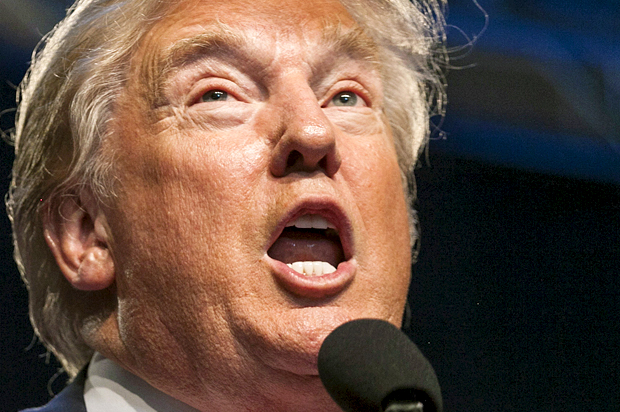In a recent interview with CNBC’s John Harwood, Donald Trump pushed back against the idea that his remarkably successful presidential campaign was, as Harwood put it, “appealing to fearful, anxious, white Americans and encouraging the belief that their problems are because of people who look different than them.” Trump said the description was wrong. He was popular with “the blacks.” He then cited an unidentified poll — which, given Trump’s track record, could very well not exist.
It wasn’t an impressive answer. But in fairness to “the Donald,” it’s hard to imagine any answer he could give that would be strong enough to overcome what, for the past few months, has been staring everyone outside the Trump bubble in the face. A campaign that is simply more reliant on bigotry, resentment and tribalism than anything presidential politics has seen since Pat Buchanan’s run in 1992. A campaign whose seeming raison d’être is to champion an ugly and reactionary version of Americanism.
Since a kind of neo-nativism is the true heart of Trump’s campaign, examples are easy to find. In fact, the most recent one happened just Wednesday, during a Trump appearance at a New Hampshire high school. In the midst of one of his reliably rambling and meandering speeches, Trump, according to the New York Times, mentioned the plight of Syria’s millions of refugees. “Now I hear we want to take in 200,000 Syrians,” Trump said, which elicited “some boos in the crowd,” reportedly. “If I win,” he promised, “they’re going back.”
As you might expect (but still hope against), the crowd’s response this time was much more favorable. And when Trump explained that the millions of refugees — more than 50 percent of whom are children — “could be ISIS” and be engaged in “one of the great tactical ploys of all time,” with “[a] 200,000-man army, maybe” creating “problems,” no one laughed. Not because they were too appalled into silence by the grotesque mix of comic book juvenilia and dehumanization; but because they agreed.
The distance between Syrian refugees in the real world and the menacing hordes of Trump’s nightmares is so vast, the case puts his specific brand of Americanism in starker relief. That makes it easier, in turn, to see how it diverges from not only the liberal conception of Americanism, but that of the mainstream, too. For example: America likes to tell itself that one of its guiding principles can be found on the Statue of Liberty. But “The New Colossus” is literally about welcoming refugees. If Trump had to truly consider the poem, it’s hard to imagine it winning his favor.
Yet that wasn’t the only revealing statement Trump made on Wednesday. He also said he was “putting the people on notice that are coming here from Syria as a part of this mass migration.” That may sound just as stupid — and no more dangerous — than the rest of his rant, but it isn’t. Because whether he knew it or not, his talk of “mass migration” was bound to be understood as a dog-whistle to a certain segment of his most ardent fanbase: white nationalists (a.k.a., white supremacists or neo-Nazis).
Not incidentally, Pat Buchanan plays an important role in the intellectual history of this movement, too. His 2001 book, “The Death of the West: How Dying Populations and Immigrant Invasions Imperil Our Culture and Civilization,” is cited by many white nationalists as their gateway. It was here they learned of a global plot to lower (white) birthrates in the West and thus allow an “invasion” of fecund immigrants to take-over from within. So when Trump rails against “mass migration,” there is no doubt that a significant number of his supporters think they know what he really means.
But whether or not Trump is dog-whistling on purpose doesn’t matter. Because the sentiment he communicated with his threat to Syria’s refugees, which has really animated his whole campaign, does not require intellectual rigor. It is extremely simple. It understands Americanism not as a philosophical orientation — not as an outgrowth of the Enlightenment — but as a physical thing. Instead of liberty and equality, blood and soil. Instead of the principles that you’ve chosen, the accidents of your birth.
Instead of sanctuary for “your tired, your poor, your huddled masses yearning to breathe free,” deportation for refugees.

